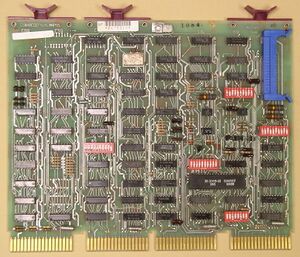DL11-W serial line unit/real-time clock option
The DL11-W serial line unit/real-time clock option was a UNIBUS peripheral which combined a DL11 (a single asynchronous serial line) and a KW11-L (line time clock) in a single quad format card (M7856).
The register addresses, interrupt vector, input and output baud rate (speeds of 110 to 9600 baud are supported), character size, parity, number of 'stop' bits, and 20mA active/passive selection are all selected by setting DIP switches on the card.
Line connection was via a 40-pin Berg connector header on the top edge of the card, using the standard DEC asynchronous serial line pinout. It provided both 20mA and EIA RS-232 connectivity. The type of line signalling used is selected by the kind of cable plugged in (as on the DL11).
It mounted in an SPC slot; to use the EIA interface, the slot must have +15V power voltage available, which is not automatically true of all backplanes with SPC slots. For the LTC to be useable, the LTC L signal (not a standard UNIBUS signal, although it is provided in the standard DEC power distribution connectors) from the system's power supply must be provided to the selected slot.
Unlike the DL11-E, it did not provide any modem control.
External links
- DL11-W serial line unit/real-time clock option user's manual (EK-DL11W-OP-001)
- DL11-W Serial Line Unit/Real-Time Clock Option Technical Manual (EK-DL11W-TM-002)
- DL11-W Field Maintenance Print Set (MP00106)
